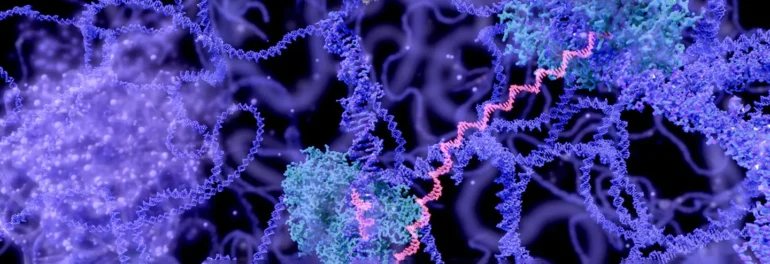Predictions for double-digit growth of the mRNA market have many small and emerging biotechs joining big pharma companies in pursuing the development of novel mRNA-based therapeutics and vaccines. The complex, multistep process involved in mRNA–LNP manufacture poses a host of novel challenges, particularly as processes are scaled. The risks involved with coordinating raw material supply, scaling, and aligning steps across multiple vendors can be mitigated by partnering with an experienced CDMO with end-to-end capabilities from cell banking to fill/finish of LNP-formulated mRNA products.
mRNA Promises Still Abound
The value of mRNA technology to human society was properly recognized in early October 2023 with the awarding of the Nobel Prize in Physiology or Medicine to Professors Katalin Kariko, Ph.D., and Drew Weissman, M.D., Ph.D., for the contributions each made to its development during their time as researchers at the University of Pennsylvania. Of course, that award was far from the only public recognition of the importance of their work, with millions worldwide having been protected by the mRNA-based vaccines developed in response to the COVID-19 pandemic.
Going forward, the market value of the mRNA vaccines and therapeutics is estimated to continue to grow rapidly for the foreseeable future. This market is estimated by several research firms
to be approximately $40–50 billion in 2022/2023 and to be expanding at a compound annual growth rate between 13% and 17%. Notably, the therapeutics sector is expected to be the major driver of further growth as demand for COVID-19 vaccines levels off.
Maximum Growth Requires Surmounting Manufacturing Hurdles
Unlike traditional biologics, which are produced via microbial fermentation or mammalian cell culture, mRNA production does not require the use of living cells and is therefore simpler overall. However, that does not mean that consistent manufacture of high-quality mRNA is easy. Lab-scale kits cannot be practically implemented at commercial scale, process control can be challenging at large scale, and batch-based processes involve many steps for which there has yet to be standardization implemented across the industry. Furthermore, mRNA instability poses significant challenges. Raw material variability and the lack of fit-for-purpose, single-use manufacturing equipment exacerbate the growing pains in this young sector.
Wacker Biotech supports clients throughout the entire journey from pDNA to the LNP formulated mRNA product

The sensitivity of mRNA molecules to temperature, shear, and degradation by ubiquitous enzymes creates the need for extensive process controls. Furthermore, processes for the generation of final products in the form of lipid nanoparticle (LNP) encapsulation of the mRNA active, which is necessary to improve stability and facilitate delivery into appropriate tissues, typically involve the use of proprietary lipids and large quantities of solvents.
Both biopharma companies and academic groups are working on solutions to these challenges to enable more robust, scalable, and cost-effective mRNA manufacturing processes. In the meantime, many developers of mRNA therapeutics and vaccines are turning to outsourcing partners with the expertise and specialized capabilities needed to produce mRNA drug substances and mRNA–LNP drug products.
Complex, Multistep Process
The production of mRNA begins with transcribing the genetic code from linearized plasmid DNA (pDNA) into mRNA. While some manufacturers create pDNA through bacterial fermentation and linearization as initial steps, many acquire pDNA from external sources. The pDNA template carries a DNA-dependent RNA polymerase promoter and the mRNA construct’s corresponding sequence. In vitro transcription (IVT), a cell-free process employing RNA polymerases derived from bacteriophages and chemically modified ribonucleoside triphosphate molecules (rNTPs), then transforms pDNA into mRNA, enhancing stability with a 5’ cap and 3’ poly-(A) tail. Downstream purification includes tangential-flow filtration (TFF) and chromatography to remove immunogenic double-stranded RNA (dsRNA), residual DNA template, RNA polymerase, and elemental impurities, followed by mRNA encapsulation in lipid nanoparticles (LNPs) using various lipid types and ratios. LNPs are formed via rapid mixing of lipid solutions with mRNA, and the final product is prepared in the desired buffer solution and concentrated using TFF.
mRNA molecule

Sequence- and Scale-Dependent Bioprocessing Considerations
The specific steps in mRNA production vary from manufacturer to manufacturer and as a function of the genetic sequence, target application, dosage, and scale. In addition, the quantity and dosage level for mRNA products vary significantly depending on the application, from large-scale vaccines to fight global pandemics to very-small-scale personalized cancer therapies. Scalability — whether up, down, or out — is therefore essential, regardless of the manufacturing strategy. Processes must provide high yields of high-quality mRNA products cost-effectively over a range from micrograms to kilograms.
Although process parameters for the IVT step will need to be adjusted depending on the specific sequence, this step of the mRNA–LNP drug product production process is fairly platformizable. Downstream purification of the mRNA drug substance can also differ, depending on the nature of the mRNA. The optimum unit operation can also vary with scale, so in some cases scaling up and down is not simply a matter of changing equipment sizes but using different equipment entirely.
Also, the pDNA and LNP manufacturing need to be adjusted depending on the product; the size and other properties of the plasmid determine the optimum upstream process parameters for pDNA production, while the mRNA sequence dictates the choice of lipids, lipid ratios, and mixing parameters. Consequently, extensive process development and optimization is often needed for each of the three major steps of mRNA manufacturing and formulation.
The instability of mRNA, including its sensitivity to temperature, shear, and ubiquitous RNase enzymes, must be managed not only during production but also during analysis and storage/distribution. Minimizing processing and handling times and freeze-thaw steps is crucial, as are monitoring and control of all process steps; all become more challenging when large process volumes are involved. Rapid analytical methods suitable for product characterization, quality control release, and stability testing, are also necessary. One way to help minimize overall production times and handling of mRNA is to establish end-to-end manufacturing capabilities from pDNA through mRNA–LNP fill/finish.
Sourcing difficulties, meanwhile, create additional challenges for scaling mRNA–LNP production. Regulatory authorities today expect that not only critical raw materials but also important ancillary materials meet GMP requirements. Access to a reliable supply of high-quality and GMP-compliant raw materials for mRNA production, including pDNA and the specialized enzymes and lipids required for IVT and LNP formation, are of particular note. The limited number of suppliers that can reliably provide high-quality and GMP-grade specialty enzymes and lipids in large quantities presents cost and availability issues.
Implementing Effective LNP Processes
Different mixing technologies can be leveraged to produce LNPs: microfluidics, such as the continuous technology developed by Precision NanoSystems, and more traditional mixing in classical mixers. Both are widely used depending on the needs and preferences of each drug developer. Development of effective processes using both approaches involves trial and error to some extent, however, because full and deep knowledge of the LNP formation process remains lacking.
Management of large quantities of flammable solvents is a separate challenge associated with current LNP processes. Such materials are not found in typical biopharmaceutical manufacturing facilities and require the implementation of special safety measures. Containment infrastructure, solvent waste disposal, and operator training are just three additional items that add cost and complexity to LNP manufacturing. Some companies elect to run multiple smaller batches rather than install the costly infrastructure required to perform larger-scale runs. In addition, because single-use equipment is not compatible with most organic solvents used in LNP processes, stainless-steel equipment, with necessary cleaning and sterilization systems, must be employed.
| Wacker Biotech Offers End-to-End mRNA CapabilitiesWacker Biotech is an established and reliable CDMO with extensive experience in the development and manufacture of many different types of biologics employing both stainless-steel bioreactors and single-use technologies, including conventional recombinant proteins, antibody fragments, fusion proteins, scaffolds/binding proteins, cytokines/interleukins, live biotherapeutic products (LBPs), vaccines, enzymes, peptides, and plasmid DNA, among others.This versatile development and production experience also gives Wacker Biotech the ability to effectively respond to customer needs in the mRNA space. In addition, the Wacker Biotech team has experience scaling these diverse types of processes, developing the necessary analytical methods for process monitoring and product release, and implementing the processes in the GMP production environment.Before the emergence of the COVID-19 pandemic, Wacker Biotech had already begun investigating in mRNA-specific technology. Indeed, during the pandemic, mRNA COVID-19 vaccine developer CureVac selected Wacker Biotech over other CDMOs to manufacture its candidate because it deemed WACKER best positioned to quickly meet its production needs. The company met expectations. In an environment with difficult material supply challenges, Wacker Biotech transferred an mRNA production process for that vaccine from the lab to commercial scale.In Germany, WACKER has secured government funding to construct a specialized facility at the Halle site, designed to enhance pandemic preparedness. This facility, set to be operational by April 2024, is uniquely structured with four production lines, accommodating varying capacity needs for pDNA, mRNA drug substance, final mRNA–LNP drug product manufacturing, and fill/finish operations. Wacker Biotech is developing these capabilities with agility in mind. The facility’s design draws on Wacker Biotech’s expertise to optimizes efficiency and the flexibility to adapt to evolving regulatory requirements and the dynamic landscape of novel modalities. Wacker Biotech’s exclusive selection as the German government’s sole CDMO partner for this pivotal pandemic preparedness initiative underscores their commitment to addressing healthcare challenges swiftly and effectively.Proprietary platform processes are being developed by Wacker Biotech for both pDNA and mRNA. A primary advantage is greater understanding, which facilitates better predictability concerning how different sequences will behave. Using standard unit operations also enables the stockpiling of important raw materials. For instance, Wacker Biotech has developed standard filter setups, bags, and buffer preparations, which are all maintained in ample quantities in the company’s warehouses.Wacker Biotech has also prioritized developing expertise in a variety of LNP process types that operate at numerous different volumes. Having capabilities in both microfluidic and traditional mixing technologies creates opportunities for a CDMO to meet the expectations of a broader range of mRNA developers. In the meantime, the company has partnered with CordenPharma, a leading expert in the production of lipids for LNP formulation. Integrating CordenPharma’s lipid production expertise and raw material supply capabilities with Wacker Biotech’s mRNA therapy development and manufacturing leadership delivers unprecedented capabilities.These efforts are complemented by Wacker Biotech’s R&D expertise. Its laboratories are outfitted with small-scale, high-throughput screening capabilities that enable thorough exploration of many different process parameters and thus greater process understanding at a reasonable cost. The process scale-up team can then confirm process performance at medium scale before transfer to production.With expertise in pDNA, mRNA drug substance, and mRNA–LNP drug product manufacturing, including fill/finish operations, Wacker Biotech can provide comprehensive, end-to-end services in support of mRNA vaccine and therapy development and production. Plasmid DNA development and production (high-quality and/or GMP mRNA) takes place in San Diego, with mRNA drug substance and mRNA–LNP drug product processes developed in Amsterdam and GMP clinical and commercial production taking place both in Amsterdam and Halle, where four parallel production lines are available.As the pharmaceutical landscape evolves rapidly, Wacker Biotech continues to fortify its position at the forefront of mRNA manufacturing. With its strategic investments, adaptable facilities, and an unwavering commitment to meet both present and future demands, WACKER stands ready to address both unforeseen global health challenges and the specific needs of its clients. The company’s proactive approach to expanding and diversifying its capabilities through platform innovation and strain and formulation development, among other activities, reaffirms its dedication to innovation and excellence in a highly competitive space. As the world looks toward the future of medicine, Wacker Biotech is poised to be an instrumental partner in the next generation of healthcare solutions. |
Addressing Coordination Challenges
Given the large number of manufacturing steps involved in the production of mRNA products through fill/finish and final packaging, it is not surprising that manufacturers lacking appropriate in-house capabilities frequently end up working with multiple service providers. That adds time, cost, and risk to the overall process, as well as greater supplier management requirements.
These challenges can be greatly reduced by working with a CDMO that provides an end-to-end, integrated offering starting with plasmid design, cell banking, and plasmid production and continuing through fill/finish of mRNA–LNP formulated products. Planning and oversight can be greatly simplified, with each step in the process well aligned. Even when transfer from one site to another is still required, those transfers occur within the same company with much reduced delays, cost, and risk, particularly if all of the sites operate under the same management, quality, and regulatory systems, have the documentation styles and review expectations, and approach raw material procurement in the same manner. Development, analytical, and production teams can also meet regularly to ensure that all activities are completely and continuously aligned across the entire value chain.
Wacker Biotech’s mRNA Competence Center in Halle, Germany (expected to be operational by April 2024)

Finding such a CDMO can be a challenge, however, because very few have experience in large-scale manufacture of mRNA drug substances and mRNA–LNP drug products. Those that do have typically focused on one of the steps — pDNA manufacture, mRNA production, mRNA–LNP formation, or fill/finish operations. Drug developers must therefore coordinate the efforts of a multitude of suppliers and manage longer timelines, greater risk, and higher costs. Effective process improvements are inhibited, and the instability of mRNA magnifies the challenges.
A Need for CDMO Flexibility
Flexibility is in fact crucial for mRNA drug developers and hence for CDMOs offering support for the development and manufacture of mRNA products. The variability in mRNA processes is further complicated by a complex intellectual property (IP) landscape, which drives each developer of mRNA vaccines and therapeutics to seek different methods to skirt existing patents, often in downstream purification techniques (e.g., preparative high-performance chromatography, ethanol precipitation, clarification chromatography) or in the LNP production step. If the CDMO offers a (platform) production process, the CDMO becomes responsible of making sure it has the freedom to operate within this landscape.
It is also worth noting that regulatory requirements for mRNA drug substances and drug products have not yet been fully established. Both the U.S. Food and Drug Administration (FDA) and the European Medicines Agency (EMA) are still learning as candidates move through the development and approval process, and further guidance is expected. More changes are anticipated with regard to analytics compared with processing.
Originally published on PharmasAlmanac.com on April 8, 2024.




